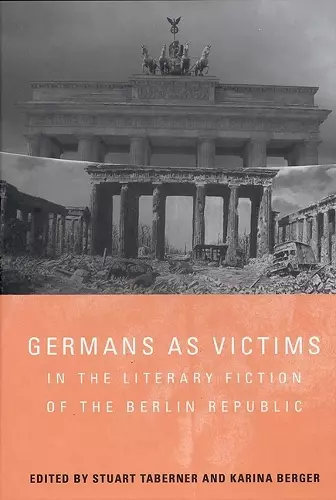Germans as Victims in the Literary Fiction of the Berlin Republic
Stuart Taberner editor Karina Berger editor
Format:Hardback
Publisher:Boydell & Brewer Ltd
Published:1st Feb '09
Currently unavailable, and unfortunately no date known when it will be back

First comprehensive look at how today's German literary fiction deals with questions of German victimhood. In recent years it has become much more accepted in Germany to consider aspects of the Second World War in which Germans were not perpetrators, but victims: the Allied bombing campaign, expulsions of "ethnic" Germans, mass rapes of German women, and postwar internment and persecution. An explosion of literary fiction on these topics has accompanied this trend. Sebald's The Air War and Literature and Grass's Crabwalk are key texts, but there are many others; the great majority seek not to revise German responsibility for the Holocaust but to balance German victimhood and German perpetration. This book of essays is the first in English to examine closely the variety ofthese texts. An opening section on the 1950s -- a decade of intense literary engagement with German victimhood before the focus shifted to German perpetration -- provides context, drawing parallels but also noting differences between the immediate postwar period and today. The second section focuses on key texts written since the mid-1990s shifts in perspectives on the Nazi past, on perpetration and victimhood, on "ordinary Germans," and on the balance between historical empathy and condemnation. Contributors: Karina Berger, Elizabeth Boa, Stephen Brockmann, David Clarke, Mary Cosgrove, Rick Crownshaw, Helen Finch, Frank Finlay, Katharina Hall, Colette Lawson, Caroline Schaumann, Helmut Schmitz, Kathrin Schödel, and Stuart Taberner. Stuart Taberner is Professor of Contemporary German Literature, Culture, and Society at the University of Leeds. Karina Berger holds a PhD in German from the University of Leeds.
[A]n impressive testament to collaborative research. The . . . essays . . . all offer highly stimulating discussions of individual texts and topics, and can be read as self-contained pieces, but the book is far more than the sum of its parts: the coherence of its argument suggests not only masterly editing, but also the real benefits of scholars with related interests working together over an extended period. [This book] will be of interest to students, specialists, and general readers alike, and given the implications of the topic, deserves the widest possible audience. * JOURNAL OF EUROPEAN STUDIES *
Contributes to a growing body of research on the evolution of memory politics in post-unification Germany... Adds important inflections to current debates... Important, thought-provoking, and fittingly nuanced. * MODERN LANGUAGE REVIEW *
The individual essays make a compelling and well-conceived contribution to an important and on-going discussion that in the ten years of its existence has gained in nuance and sophistication. * MONATSHEFTE *
Provides a valuable overview about the range and complexity of literary accounts on 'German suffering. * GERMAN STUDIES REVIEW *
Provocative yet accessible to a wide audience. * CHOICE *
The volume adds support to the argument that the notion of 'German victims' did not begin with the fall of the Berlin Wall. * GERMAN QUARTERLY *
Clearly structured, with a common theme that gives the work cohesion.... Will certainly stimulate academic debate and scholarship for years to come. * H-NET GERMAN *
Has an impressive array of contributions. . . . [C]ertainly demonstrates the complexities of the current debates. * THIS YEAR'S WORK IN MODERN LANGUAGE STUDIES *
ISBN: 9781571133939
Dimensions: unknown
Weight: 552g
268 pages